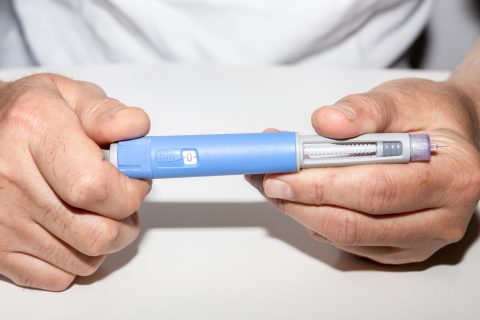
Mounjaro Lawsuit
Mounjaro lawsuits claim the Type 2 diabetes drug can cause severe gastrointestinal problems such as gastroparesis, ileus or intestinal blockage. In February 2024, Mounjaro lawsuits were consolidated with other similar drugs in a federal multidistrict litigation.
See If You Qualify for a Weight Loss and Diabetes Drug Lawsuit
You may be entitled to compensation if you were injured after taking a medication like Ozempic, Saxenda or Wegovy. For a free case review, complete the form or call 866-898-3173.
- A+BBB Rating
- 4.9 StarGoogle Reviews
- A+BBB Rating
- 4.9 StarGoogle Reviews
Mounjaro Lawsuit Status
On Feb. 2, 2024, Mounjaro lawsuits were among 55 lawsuits targeting its drug class combined in a federal multidistrict litigation in the Eastern District of Pennsylvania.
As of April 2025, there are 1,685 pending lawsuits in the GLP-1 MDL. The lawsuits are in their initial stages, and no settlements or jury trials have been scheduled yet. The law firm Morgan & Morgan filed the first lawsuit on behalf of Jaclyn Bjorkland. The firm is now investigating several thousand claims, according to attorney Jonathan Sedgh.
The Bjorkland lawsuit and others claim Mounjaro (tirzepatide) and Ozempic (semaglutide), another Type 2 diabetes drug, caused serious personal injury with symptoms ranging from severe vomiting to gastrointestinal burning. Several other Ozempic lawsuits make similar claims.
Latest Updates in Mounjaro Lawsuits
-
September 2024:
We've seen a huge jump in the number of lawsuits filed in the Mounjaro MDL in the last month, with active cases rising from 346 at the start of August to 869 in the first week of September. We're continuing to closely monitor the progress of these lawsuits.
-
June 2024:
Judge Karen S. Marston has taken over the MDL following the death of Judge Pratter last month. Marston met with attorneys in a status conference, but we don't have any new information yet regarding the direction of the MDL.
-
May 2024:
The presiding judge in the Mounjaro MDL, U.S. District Judge Gene E. K. Pratter, died in Philadelphia on May 17. The Judicial Panel on Multidistrict Litigation will have to reassign the case to a new judge, prompting delays in the litigation.
-
May 2024:
Judge Pratter named Paul Pennock of Morgan & Morgan and other attorneys to the MDL's Plaintiff's Committee. These committees help guide the litigation while representing all plaintiffs in the MDL.
-
February 2024:
Mounjaro lawsuits were included among 55 lawsuits claiming GLP-1 RAS class drugs — which also include Ozempic and Wegovy — consolidated into a multidistrict litigation in Pennsylvania. Plaintiffs' lawyers said as many as 10,000 such lawsuits may eventually be filed.
-
December 2023:
Novo Nordisk attempted to get Jaclyn Bjorklund's Ozempic lawsuit dismissed, but a judge cleared it to proceed. Bjorklund also named Eli Lilly and Mounjaro in her lawsuit.
-
September 2023:
Eli Lilly filed lawsuits against compounding pharmacies, medspas and wellness centers over the fraudulent distribution of counterfeit products labeled as Mounjaro.
-
August 2023:
The law firm Morgan & Morgan filed a claim in federal district court on behalf of its client, Jaclyn Bjorklund. The named defendants are Novo Nordisk and Eli Lilly and Company.
-
May 2022:
The U.S. Food and Drug Administration approved Eli Lilly’s Mounjaro to help control blood sugar levels in patients with Type 2 diabetes. The approval notes the risk of gastrointestinal side effects.
Although Eli Lilly and Company’s Mounjaro is FDA-approved to treat Type 2 diabetes, many doctors prescribe it off-label as a weight loss medication. Clinical studies have shown it to be more effective than semaglutide for weight loss and blood sugar control. However, it can cause serious health complications that require hospitalization for treatment.
So far, there are no Mounjaro class-action lawsuits, and the existing lawsuits are product liability cases.
Why Are Mounjaro Lawsuits Being Filed?
Mounjaro can cause serious gastrointestinal side effects, including gastroparesis, or stomach paralysis. Severe gastroparesis can cause prolonged vomiting that lasts for at least four weeks and it’s a key qualifier for joining the ongoing Mounjaro lawsuits. Lawyers are also investigating cases for ileus and intestinal blockages or obstructions. Patients claim Eli Lilly failed to provide adequate warnings about the risks of severe side effects associated with using Mounjaro.
This relatively new Type 2 diabetes medication targets how the body digests food by activating the GLP-1 and GIP receptors. For some patients, it slows digestion and absorption to the point that the stomach no longer functions properly. Certain foods, such as those high in fat, can increase the likelihood of negative side effects with this class of medications.
“Plaintiff was caused to suffer from severe gastrointestinal events, which resulted in, for example, severe vomiting, stomach pain, gastrointestinal burning, being hospitalized for stomach issues on several occasions including visits to the emergency room.”
Although there is no current FDA approval for the purpose, many doctors prescribe Mounjaro for weight loss. Some wellness centers and compounding pharmacies are also producing their own versions of the medication, potentially increasing the risk of side effects and patient harm.
What Is Gastroparesis?
Gastroparesis is a disorder caused when food moves too slowly or stops moving from the stomach to the small intestine. It is a serious medical condition. It can contribute to malnutrition, dehydration and acute kidney disorders.
Symptoms of gastroparesis include bloating, early satiety, nausea, upper abdominal pain and vomiting that can last for weeks or months. If food remains in the stomach too long, it may form into masses called bezoars. These can contribute to additional gastrointestinal problems such as intestinal blockages and may have to be surgically removed.
Disordered stomach emptying is relatively common in patients with diabetes, but medications such as Mounjaro that affect digestion and stomach emptying can aggravate the condition. Additionally, GLP-1 receptors may trigger gastroparesis in some patients with no history of the condition.
Clinical trials of semaglutide and tirzepatide found an increased risk of this severe side effect. The FDA noted this in its approvals of the medications and manufacturers include it in patient warning information. In September 2023, the FDA added a warning for intestinal blockages to the Ozempic label.
Qualifying To File a Mounjaro Lawsuit
In order to qualify for a Mounjaro lawsuit, people must have taken Mounjaro and suffered from prolonged vomiting, gastroparesis, ileus and intestinal obstruction or blockage. It is important to remember that not everyone who took Mounjaro and experienced side effects qualifies to file a lawsuit.
The best way to establish eligibility for joining ongoing litigation is to speak with an experienced attorney. During a consultation, they will review your case and determine if you qualify to file a claim seeking compensation for medical expenses and lost wages.
How To File a Mounjaro Lawsuit
If you decide to seek compensation for injuries related to taking Mounjaro, consult with a knowledgeable attorney. A legal professional can determine how to proceed and guide you through the process of filing a lawsuit.
- Consult an experienced product liability attorney.
- Work with the law firm to gather any necessary documentation.
- Have your attorney file a claim on your behalf.
It’s important to decide whether you want to join a Mounjaro class-action lawsuit or file an individual injury claim. Class actions typically claim financial damages related to the purchase of the drug or faulty product. So far, there are no established class actions, and attorneys are only accepting gastroparesis claims.
Choosing a Mounjaro Lawyer
Filing lawsuits against Mounjaro is a major undertaking that requires experience and subject matter knowledge. The firm you choose will represent you throughout the entire legal process. Therefore, finding the right attorney is critical to a successful claim.
- Clear Communicator: Look for an attorney who has a clear style of communication and explains things in a way you understand.
- Demonstrated Record of Success: Product liability attorneys should be able to provide examples of successful litigation that are similar to your case.
- Free Consultations: Top injury attorneys offer free consultations and case reviews to give you a clear picture of where you stand.
- Personal Compatibility: You should be comfortable speaking with your attorney and sharing personal details related to your health and the effects of taking Mounjaro.
- Transparent Payment Structure: Ask about how your attorney will structure any attorneys fees. In product liability injury cases, it’s typical that attorneys only take their fee if they recover a settlement or jury verdict on your behalf.
Make sure you interview at least three law firms and pick the one that works best for you. Experience, a history of success in similar cases and good communication are three of the most important things to look for in an attorney.
Calling this number connects you with a Drugwatch.com representative. We will direct you to one of our trusted legal partners for a free case review.
Drugwatch.com's trusted legal partners support the organization's mission to keep people safe from dangerous drugs and medical devices. For more information, visit our partners page.






